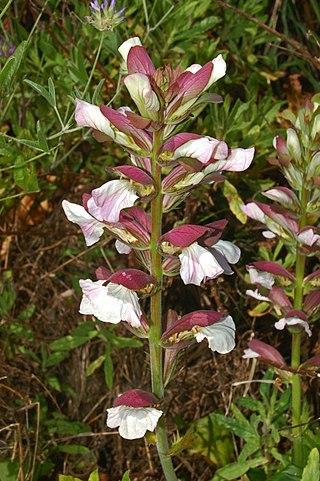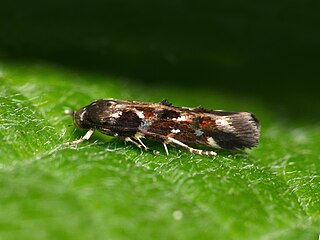
The Circaea, or enchanter's nightshades, are a genus of flowering plants in the evening primrose family Onagraceae. About two dozen taxa have been described, including eight species. Plants of the genus occur throughout the temperate and boreal forests of the Northern Hemisphere. Three taxa occur in North America: Circaea alpina, Circaea canadensis, and the hybrid Circaea × sterilis. The generic name Circaea refers to the enchantress Circe from Greek mythology who is said to have used the herb as a charm.

Acanthus mollis, commonly known as bear's breeches, sea dock, bear's foot plant, sea holly, gator plant or oyster plant, is a species of plant in the family Acanthaceae and is native to the Mediterranean region. It is a leafy, clump-forming perennial herb, with a rosette of relatively large, lobed or toothed leaves, and purplish and white flowers on an erect spike.

Persoonia, commonly known as geebungs or snottygobbles, is a genus of about one hundred species of flowering plants in the family Proteaceae. Plants in the genus Persoonia are shrubs or small trees usually with smooth bark, simple leaves and usually yellow flowers arranged along a raceme, each flower with a leaf or scale leaf at the base. The fruit is a drupe.

Nepenthes mollis, or the velvet pitcher-plant, is a tropical pitcher plant species natives to Kalimantan, Borneo. It used to be known only from a single dried herbarium specimen and is the sole recognised species in the genus Nepenthes of which the pitchers are unknown. In 2019 Global Wildlife Conservation announced the rediscovery of the species.

Nepenthes hurrelliana is a tropical pitcher plant endemic to Borneo, where it has been recorded from northern Sarawak, southwestern Sabah, and Brunei. It is of putative hybrid origin; its two original parent species are thought to be N. fusca and N. veitchii. A thick indumentum of rusty-brown hairs covers the entire plant, a characteristic presumably inherited from the latter.

Circaea lutetiana, known as broad-leaved enchanter's nightshade, is a plant in the evening primrose family, Onagraceae.

Theretra japonica is a moth of the family Sphingidae first described by Jean Baptiste Boisduval in 1869.

Mompha terminella is a moth in the family Momphidae found in Europe and North America.

Circaea alpina, commonly called alpine enchanter's nightshade, small enchanter's nightshade, or dwarf enchanter's nightshade is a 10–30 cm tall perennial herb found in cool forests of the Northern Hemisphere.

Metatropis rufescens is a species of true bugs. The species is found in Europe, with the exception of the far North and South then East to the Black Sea region and across the Palearctic to Siberia. In Central Europe it is common, but it is not found everywhere. In the British Isles it is common in the South including Wales and Ireland. It occurs in shady, mostly moist habitats in deciduous forests.
Briarwood Banks is the name given to a woodland Site of Special Scientific Interest (SSSI) in north Northumberland, North East England. Composed mainly of elm, oak and ash, the site is semi-natural and now recovering from the removal of planted conifers.

Circaea canadensis, known as eastern enchanter's nightshade, Canada enchanter's nightshade, broad-leaved enchanter's nightshade, is a perennial herbaceous plant found in forests of eastern North America. It is very similar to its sister species, Circaea lutetiana, and was formerly considered conspecific.
Circaea × intermedia is a hybrid of flowering plants in the evening primrose family Onagraceae. The parents of the hybrid are Circaea alpina and Circaea lutetiana.
Circaea × sterilis is a hybrid of flowering plants in the evening primrose family Onagraceae. The parents of the hybrid are Circaea alpina and Circaea canadensis.
Circaea × decipiens is a hybrid of flowering plants in the evening primrose family Onagraceae. The parents of the hybrid are Circaea erubescens and Circaea canadensis subsp. quadrisulcata.
Circaea × mentiens is a hybrid of flowering plants in the evening primrose family Onagraceae. The parents of the hybrid are Circaea alpina and Circaea erubescens.
Circaea × skvortsovii is a hybrid of flowering plants in the evening primrose family Onagraceae. The parents of the hybrid are Circaea cordata and Circaea canadensis subsp. quadrisulcata.
Circaea × ovata is a hybrid of flowering plants in the evening primrose family Onagraceae. The parents of the hybrid are Circaea cordata and Circaea mollis.
Circaea × dubia is a hybrid of flowering plants in the evening primrose family Onagraceae. The parents of the hybrid are Circaea cordata and Circaea erubescens.
Circaea × taronensis is a hybrid of flowering plants in the evening primrose family Onagraceae. The parents of the hybrid are Circaea alpina subsp. imaicola and Circaea cordata.











